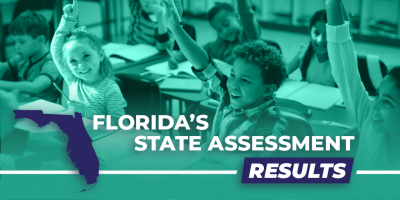Florida’s State Assessment Results Continue to Show the Value of In-Person Instruction

Published on: Jul 29, 2021
Florida’s State Assessment Results Continue to Show the Value of In-Person Instruction
~ 94% of all Florida Students Participated in Statewide Assessments~
Tallahassee, Fla., July 29, 2021 – Today, Florida announced that nearly 94% of students successfully participated during the 2021 statewide assessment window – more than any other state in the union. These findings indicate that, on average, districts with higher rates of in-person instruction generally fared better than districts with higher rates of innovative instruction.
The results show that Florida’ students will continue to need additional supports to recover lost learning. This also means Florida’s educators will have deeper insight into the vast majority of student academic performance to develop personalized strategies to improve achievement outcomes during the 2021-2022 school year beginning in the coming weeks. Governor Ron DeSantis, Commissioner of Education Richard Corcoran and Florida’s school district superintendents’ urgent actions to guarantee families had the ability choose in-person learning clearly positively impacted students and gives Florida’s teachers the information necessary to help those students next school year.
Florida proactively released a series of Emergency Orders in 2020 (DOE-2020-EO-06 and DOE-2020-EO-07) to address anticipated disruptions to student learning throughout the global pandemic. Overall, the Emergency Orders were designed to ensure that parents were able to choose the learning environment that was best for their family – especially the requirement that districts must offer parents an option to send their child to in-person instruction 5 days a week. Approximately 80% of Florida students received in-person instruction either full- or part-time during the 2020-2021 school year.
After the nationwide cancellation of assessments in 2020, Florida leaders, parents and school districts fully embraced progress monitoring systems throughout the 2020-2021 school year to inform them of each student’s progression so decisions could be made to ensure optimum learning in almost real-time. A majority of students participated in progress monitoring that gave parents and educators meaningful, relevant data to support their student’s academic growth. Additionally, these diagnostic tools allowed them to identify student deficiencies in learning and focus targeted resources and supports to improve student achievement throughout the school year before a student took a statewide assessment.
As witnessed earlier with Florida’s Grade 3 i-Ready reading results, progress monitoring data suggests that Florida students are performing at a higher level than their national counterparts in Grades 3 through 6 on both i-Ready reading and mathematics. Today’s results show that progress monitoring is a highly accurate predictor of student performance prior to testing, and played an important part in preventing the “COVID slide” from being worse.
2021 statewide assessment results include:
English Language Arts (ELA)
- Approximately 96% of students enrolled were assessed in ELA.
- ELA achievement gaps between White and African American students and between White and Hispanic students did not widen, with the gap narrowing slightly in middle and high school.
- Overall, Grades 3-10 ELA performance decreased by 3 percentage points (55% to 52%).
- Charter school Grade 3-10 ELA performance has outperformed non-charter schools on the FSA ELA by having a higher percentage of students performing at Level 3 and above (59% vs. 51%).
- Charter school performance has been consistently higher than non-charter school performance since the FSA was first administered in 2015.
Mathematics
- Approximately 93% of students enrolled were assessed in math.
- Charter schools outperformed non-charter schools in ELA and mathematics across all grades.
- Grades 3-8 mathematics (FSA and End Of Course Exams [EOC] combined) decreased by 10 percentage points (61% to 51%).
- Geometry EOC performance decreased by 11 percentage points (57% to 46%), while the Algebra 1 EOC performance overall decreased by 13 percentage points (60% to 47%).
Science and Social Studies
- Approximately 92% of science and 89% of social studies students enrolled were assessed.
- Charter schools generally outperformed non-charter schools in middle school science and social studies, and performed on par with them in elementary school science.
- Grade 5 Science performance decreased by 6 percentage points (53% to 47%).
- Grade 8 Science (including Grade 8 students who took the Biology 1 EOC) performance decreased by 3 percentage points (51% to 48%).
- Biology 1 EOC performance decreased by 5 percentage points (67% to 62%).
- U.S. History EOC performance decreased by 6 percentage points (69% to 63%), while the Civics EOC performance decreased by 7 percentage points from (71% to 64%).
- The drop in civics has been proactively addressed with the inclusion of the new postsecondary assessment and course requirement (HB 1108) during the 2021 Legislative Session, as well as the recently-approved new Civics Standards at the July State Board of Education meeting.
For complete information on the 2021 results, visit Statewide Assessments.